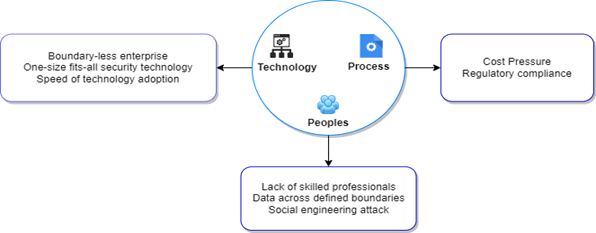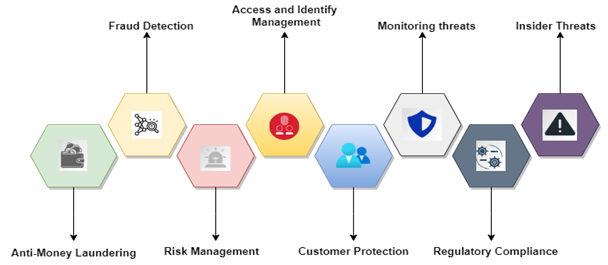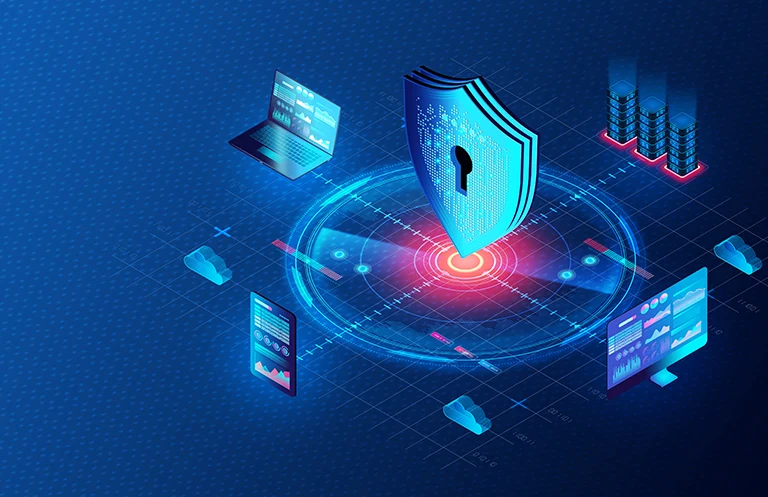What is Predictive AI?
Artificial Intelligence (AI) refers to a broad range of technologies that can mimic how humans think by using computer systems and data collected from external sources. AI can generate new knowledge based on mechanisms that enable it to acquire, store, process, and apply prior knowledge due to its possession of advanced levels of human intelligence.
Additional context regarding AI models is outlined in the section below. AI models encompass neural networks, machine learning, expert systems, and deep learning, among others.
A data analysis technique called predictive AI can predict and foresee future requirements or events for a company. This capability enables the anticipation of trends, risks, and potential solutions, among other factors. Naturally, historical, and current data serve as the foundation of predictive artificial intelligence.
What is Cybersecurity?
Cybersecurity is the process of defending electronic systems, mobile devices, computers, servers, networks, and data from malicious intrusions. It is frequently referred to as information technology security or electronic information security. The term is used in various domains, including business and mobile computing. Cyber security is the application of technologies, practices, and policies to thwart cyberattacks on systems, networks, programs, devices, and data. Its objectives are to reduce the threat of cyberattacks and safeguard against unauthorized access to technology, networks, and systems. Cybersecurity consulting services play a crucial role in helping organizations develop robust cybersecurity strategies, assess vulnerabilities, and implement effective security measures to protect their digital assets.
Predictive AI in Cybersecurity

Fig. Eliminating the complexity in cybersecurity with AI.
In recent years, Artificial Intelligence (AI) has evolved into a critical tool for assisting the work of human information security teams. AI provides much-needed analysis and threat identification that cybersecurity professionals can use to reduce breach risk and strengthen security posture. This is particularly crucial because humans can no longer scale to adequately protect the dynamic enterprise attack surface.
In terms of security, AI can categorize risks, instantly identify malware on a network, direct incident response, and identify intrusions before they happen. AI makes it possible for cybersecurity teams to create potent human-machine partnerships that advance our understanding, improve our lives, and enhance cybersecurity in a way that seems to be more than the sum of its parts.
Predictive AI Applications in Cybersecurity
● Threat Monitoring Automation
It needs to sift through a substantial amount of unstructured and structured data to efficiently monitor network threats. Doing this on your own would take a long time, and even if you hire many people to check, you can’t be certain that you haven’t missed any important pieces of information.
This eliminates human errors and makes the method more cost-effective in the long run compared to having employees manually check your data.
● Decision-making for Risk Management and Incident Response
Manual responses alone are insufficient to counter automated attacks. AI and machine learning can differentiate between beneficial bots (like search engine crawlers) and dangerous bots, as well as between individual users and website visitors.
When confronted with an impending threat, predictive artificial intelligence can sift through massive amounts of data to provide rational decisions. This enhanced predictive analysis method provides more data-anchored options and valuable cybersecurity insights that you can leverage when making strategic decisions or selecting incident response steps.
To prevent data breaches, you can also integrate these advanced cybersecurity policies when dealing with third-party services. For instance, AI can manage your contracts, enabling you to adopt more modern and consistent practices that employ better tools and secure procedures.
● Cyber Risk Detection and Prediction
The main advantage of using Predictive AI for your cybersecurity needs is that it performs risk sensing and prediction processes more efficiently and fluidly than human manual checking and restrictive rule-based algorithms. This highly efficient process, based on predictive AI’s self-learning capabilities, enables businesses to discover new anomalies, assess risks associated with these new anomalies, and forecast future risks.
Predictive AI, for instance, can identify problems with the newly integrated customer service management of social media accounts.

Fig. Process of Cybersecurity Applications used in AI.
To reduce the possibility of any unauthorized access or change of application resources, secure application designs, secure code, rigorous data input validation, and threat modelling are required. Artificial Intelligence in cybersecurity examines system usage trends to spot possibly harmful behavior or threat actors and foresee cyberattacks. AI-powered automatic monitoring safeguards systems round-the-clock and helps businesses to take precautions before harm is done. Some significant uses of AI in cybersecurity include:
- Phishing and malware detection
- Comprehension consolidation
- Detection and ranking of new threats.
- Breach risk assessment
- Automation of work
- Giving IoT security a boost
- Taking your cloud security to the next level
AI-based systems can provide better context for reacting to security warnings, prioritizing them, responding quickly to events, and identifying the root causes of problems to close vulnerabilities and avoid future difficulties. Threat exposure, IT asset inventory, and control efficiency are all taken into account. Companies can now predict where and how they will be attacked using AI-based systems, enabling them to allocate resources and tools to vulnerable areas.
eInfochips has assisted businesses worldwide develop, implement, and maintain security solutions utilizing strategic, transformational, and managed operations methodologies. To comply with security industry standards, norms, and recommendations such as NIST, ENISA, OWASP, MITRE, and IoT Security Foundation, expertise in cybersecurity is imperative. This encompasses threat modelling and VAPT (Vulnerability Assessment and Penetration Testing) for devices, OS/firmware, web/mobile apps, data, and cloud workloads. Additionally, eInfochips offers AI/ML technology integration to further enhance security measures.












